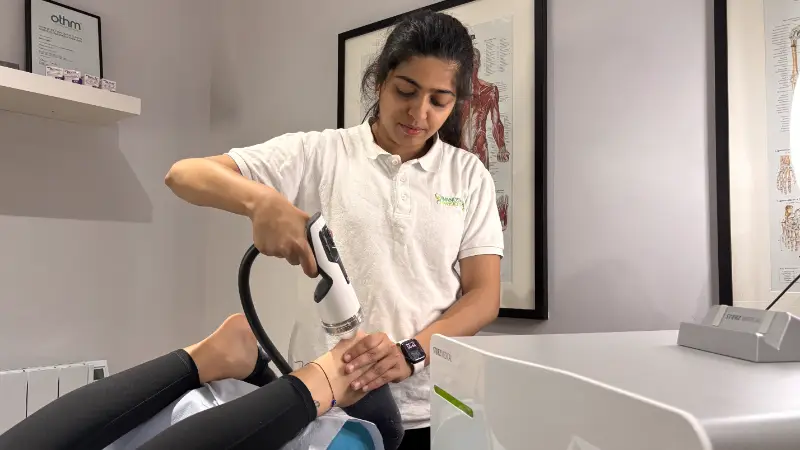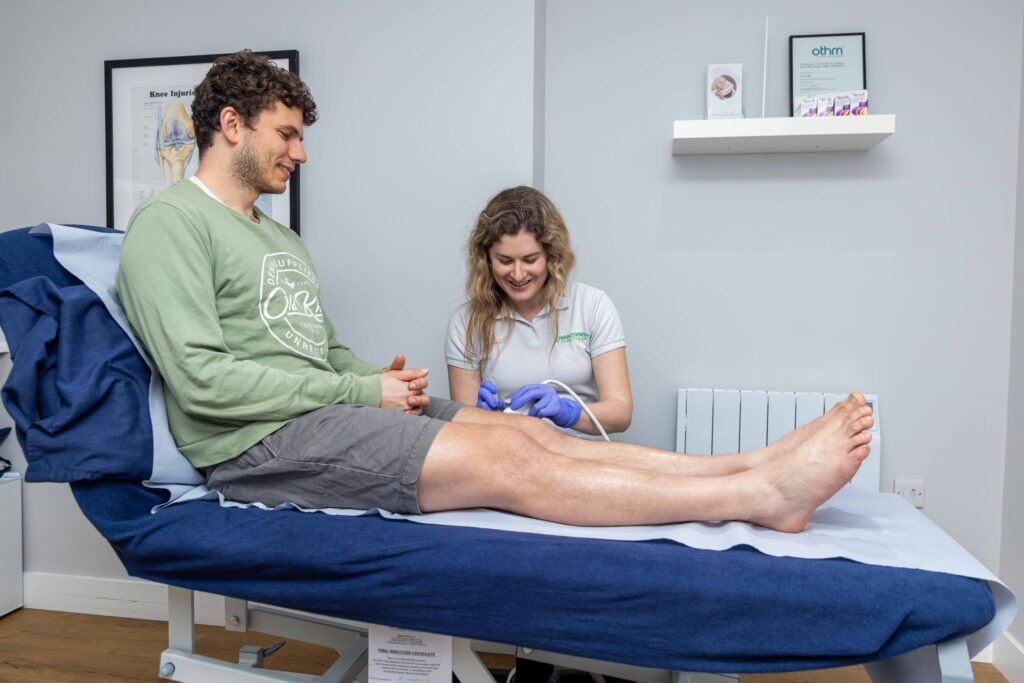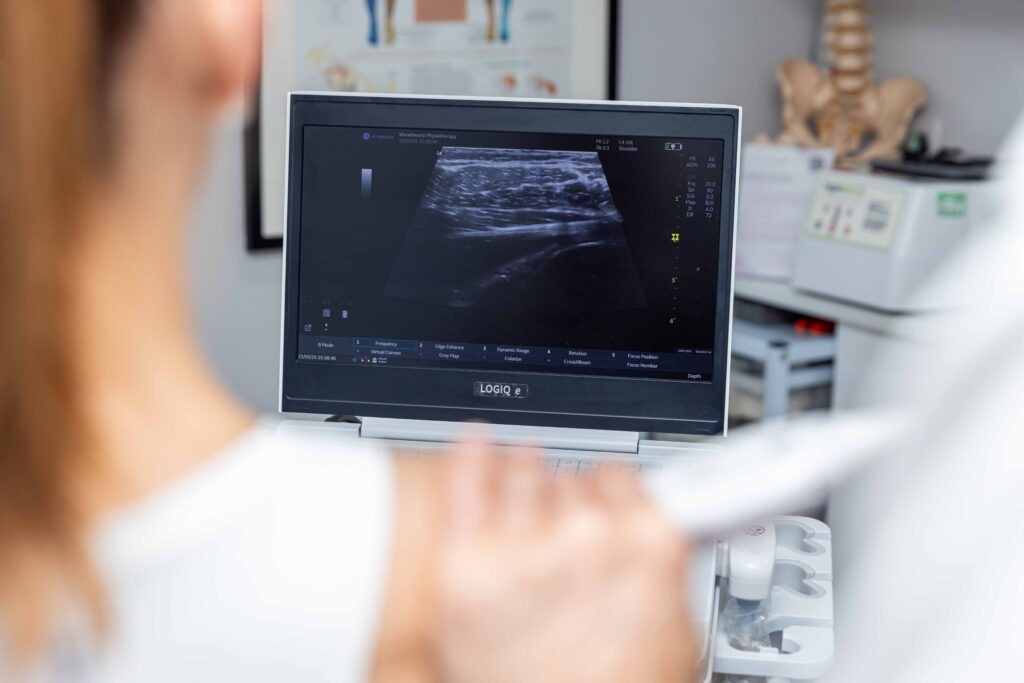October marks Menopause Awareness Month – a chance to shine a light on the unique health challenges women face throughout life, and the support available to help them stay active and well with Women’s Health Physiotherapy.
Women’s health physiotherapy is often considered to be all about pelvic health (more on this at a later date!) however there are lots of other non-pelvic health conditions that women suffer from to a greater extent than men.
At Wandsworth Physiotherapy, we believe that it’s about helping women of all ages manage pain, improve mobility, prevent injury, and enhance quality of life.
This month, we’re exploring why women are more prone to certain musculoskeletal conditions. How hormonal changes, pregnancy, childbirth, menopause, and the natural ageing process can all affect the muscles, tendons, and joints, as well as the pelvis and connective tissues.
Our approach is to combine specialist assessment, exercise rehabilitation, and advanced treatment options like focused shockwave therapy and ultrasound-guided injections to help our patients achieve lasting relief.
Our Women’s Health Physiotherapy team here to help women stay active, pain-free, and confident
Women’s Health Physiotherapy: Anatomy and Hormones – How They Affect Muscles, Joints and Tendons
Women’s musculoskeletal health is influenced by a combination of anatomy, hormones, age, and lifestyle factors.
During puberty, the rise in oestrogen encourages bone growth and connective tissue flexibility; great for mobility, but it can sometimes mean joints are more prone to strain. Later in life, hormonal fluctuations through pregnancy, perimenopause, and menopause can impact bone density, tendon strength, and muscle recovery.
Oestrogen plays a particularly protective role in maintaining collagen, the protein that gives strength and elasticity to tendons and ligaments. When oestrogen levels drop (such as in perimenopause and especially after menopause), tendons often become less resilient, joints stiffer, and bones more vulnerable to thinning or injury.
Add in the physical demands of childcare, work, and exercise, plus the structural effects of pregnancy and childbirth on the pelvis, and it’s no surprise many women experience a combination of joint, tendon, and pelvic issues as they move through different life stages.
Below are some of the most common MSK conditions the Women’s Health Physiotherapy team see in our MSK women’s health clinic, and the effective treatments we can offer.

Common Joint Problems in Women
Frozen Shoulder (Adhesive Capsulitis) – Most common in women between 40-60
Not often considered a Women’s Health Physiotherapy problem, if you’ve ever experienced a stiff, and very painful shoulder, you may have experienced frozen shoulder.
Frozen shoulder, (or adhesive capsulitis), is a condition where the shoulder joint’s protective, soft tissue capsule becomes inflamed, thickened, and contracted, causing significant pain and a progressive loss of movement.
It is particularly common in women, due to potential hormonal changes, especially during menopause, impacting collagen production, connective tissue and joint flexibility.
Other risk factors include age (40-60), diabetes, and thyroid disorders, which are also more prevalent in women.
It can take many months to resolve without help. At the Wandsworth Physiotherapy Clinic we have a specialist shoulder service and can help you with any shoulder issues you are experiencing.
Facet Joint Syndrome – Lower Back Pain and Stiffness
Facet joints are the small stabilising joints in the spine that help control movement. Over time, they can become irritated or arthritic, which can lead to a condition called facet joint syndrome.
This is a common cause of lower back pain, especially in women whose posture, joint laxity, or muscle tone may change during or after pregnancy or throughout perimenopause or menopause.
The pelvic floor muscles are intimately linked to the other spinal stabilising muscles and any dysfunction in this system can alter movement, cause joint instability and lead to pain.
Sacroiliac Joint (SIJ) Syndrome – Pelvic and Lower Back Pain
The sacroiliac joints connect the lower spine to the pelvis and play an important role in transferring weight between the upper and lower body. Pregnancy, childbirth, or ligament laxity from hormonal changes can place extra strain on these joints.
Even after pregnancy, uneven loading through these joints; from lifting children or returning to running, can keep symptoms recurring.
Women often describe deep pain in the lower back, sometimes leading to pain that radiates to the hips, buttocks, or thighs, that worsens with standing or walking. Women’s Health Physiotherapy is ideal for back and pelvic pain for anyone pre or post natal.
Coccydynia – Tailbone Pain
Coccydynia, or tailbone pain, is often caused by the stresses of childbirth, prolonged sitting, or from a fall onto the tailbone.
Pain can be sharp or aching, and can make sitting and driving very uncomfortable. It may also worsen when transitioning from sitting to standing.
Because the coccyx is close to pelvic floor muscles, dysfunction in this area can also contribute to symptoms. Our Women’s Health Physiotherapy team are trained to treat this painful and sometimes debilitating condition.
Osteitis Pubis – Pain at the Front of the Pelvis
This condition involves inflammation where the two halves of the pelvis meet at the front (the pubic symphysis). It is commonly seen in women who are pregnant, postpartum, or active in sports involving twisting movements like running or football.
Pain may be felt across the front of the pelvis or into the groin and inner thigh.
Tendon and Soft Tissue Conditions in Women
As women age or experience hormonal fluctuations, tendons can become more vulnerable to micro-tears and reduced healing capacity.
These issues can cause persistent pain and limit activity – but with targeted physiotherapy, recovery is achievable.
Greater Trochanteric Pain Syndrome (GTPS)
One of the most common causes of outer hip pain in women, GTPS affects the tendons of the gluteal muscles where they attach to the hip and the bursa that sits underneath.
It causes pain and tenderness over the outside of the hip, often radiating down the thigh, and worsens with lying on the affected side.
It’s typically due to irritation of the gluteal tendons or bursae.
It’s especially common in women over 40, often linked to changes in pelvic alignment, hip stability, or reduced muscle strength following menopause or childbirth.
Proximal Hamstring Tendinopathy
If you experience deep pain at the top of your thigh, lower buttock or sitting bones, especially after long periods of sitting or exercise, you may have proximal hamstring tendinopathy.
This deep ache or sharp pain occurs where the hamstring attaches to the sitting bone, often made worse by running, sitting, or bending forward.
It’s common in active women who run, cycle, or do yoga, or those returning to exercise after pregnancy, when the hamstring tension increases due to pelvic or postural changes.
Achilles Tendinopathy
Achilles tendinopathy causes stiffness and pain in the tendon at the back of the heel. The Achilles tendon connects the calf muscles to the heel bone and is another area that can be affected by hormonal changes.
Reduced oestrogen can reduce tendon elasticity, slow tendon repair and collagen turnover, making Achilles tendinopathy more likely, particularly in women who are keen runners or wear heeled footwear regularly.
How Physiotherapy Helps – Traditional and Advanced Treatments
At Wandsworth Physiotherapy Clinic, our Women’s Health Physiotherapy team offer a wide range of treatments to help women recover from joint and soft tissue conditions; combining a mix of hands-on physiotherapy, exercise and rehabilitation, and advanced technology such as shockwave therapy or ultrasound guided injections.
Our goal is to not only reduce your pain and symptoms but also improve strength, mobility, and long-term resilience, to prevent relapses.
Traditional Physiotherapy Treatments
- Manual therapy and joint mobilisation – These hands-on treatments are used to restore range of motion and reduce stiffness.
- Exercise rehabilitation – A cornerstone to physiotherapy is tailored strengthening and stretching programmes to improve muscle balance and posture. Strengthening exercises will help rebuild resilience and prevent recurrence
- Postural and ergonomic advice – We can address any biomechanical and lifestyle factors that contribute to your recurring pain.
- Heat or cold therapy and taping – This can be helpful for symptom management and inflammation control.
Advanced Treatment Options for Joint and Soft Tissue Conditions
· Focused Shockwave Therapy

Unlike the ‘radial’ shockwave used in some clinics, focused shockwave therapy that we use at Wandsworth Physiotherapy, penetrates deeper into the tissues, making it suitable for both musculoskeletal and pelvic conditions.
It is a non-invasive treatment that promotes blood flow and tissue repair, it promotes healing, reduces pain, and improves tendon health without the need for medication or surgery.
It’s particularly valuable for women because it’s safe, effective, and doesn’t involve medication – ideal for those who are pregnant, breastfeeding, or postmenopausal.
· Ultrasound-Guided Injections (USGIs)
For conditions involving persistent inflammation, such as frozen shoulder or joint pain, we offer ultrasound-guided injections (USGIs) to deliver targeted anti-inflammatory medication directly into the problem area.

This precision-guided technique ensures the injection is placed exactly where it’s needed for the best results. It also minimises discomfort, speeding up recovery and allowing physiotherapy to begin sooner.
· Diagnostic Ultrasound Scanning

This diagnostic tool is used to assess tendon and soft tissue injuries accurately, guiding treatment and tracking progress.
These treatments can be particularly beneficial for conditions such as shoulder pain, GTPS, and chronic tendon pain, helping women return to everyday activities pain free.
Specialist Services at Wandsworth Physiotherapy Clinic
At Wandsworth Physiotherapy Clinic, our Women’s Health Physiotherapy team understand that every woman’s health journey is unique. That’s why we offer a complete range of specialist services to complement your physiotherapy and enhance overall wellbeing.
- Massage Therapy – relieves muscle tension, improves circulation, and supports recovery.
- Pregnancy Massage – safe, gentle massage for relaxation, pain relief, and improved circulation during pregnancy.
- Clinical Pilates – focuses on core strength, posture, and alignment, ideal for postnatal recovery or managing back pain.
- Yoga Therapy – promotes flexibility, balance, and mental wellbeing, suitable for all ages and fitness levels.
- Acupuncture – helps reduce pain, improve energy flow, and promote healing for musculoskeletal or pelvic conditions.
- Podiatry – addresses foot and lower limb mechanics to improve alignment and reduce strain on joints and tendons.
- Nutrition Support – guidance to optimise bone, tendon, and hormonal health through diet, especially around menopause or postpartum recovery.
These complementary therapies provide a holistic framework for healing, helping women feel balanced, energised, and supported inside and out.
Supporting Women at Every Stage
From teenage sport injuries to postnatal recovery and menopause-related pain, women’s health is complex, but with the right care, these challenges are entirely manageable with Women’s Health Physiotherapy.
At Wandsworth Physiotherapy Clinic, our Women’s Health Physiotherapy team passionate about supporting women through every chapter of life and our staff keep up to date with leading topics in this field taught by the POGP.
Whether you’re struggling with hip pain, shoulder stiffness, or pelvic pain, our expert team can help you move more freely and feel your best again. Book in for a women’s health or pelvic health assessment to see how we can help.